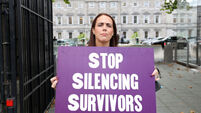Over 22,000 helpline calls to DRCC as survivors seek support in record numbers

More than 22,000 calls were received to its national helpline – breaking the 20,000 mark for the first time. File picture
Record numbers turned to the Dublin Rape Crisis Centre (DRCC) for support last year, amid concerns that online content is leading to acts of sexual violence.
The 2024 annual report from the DRCC is being published today and highlights that the number of reports received last year was the highest in its 46-year history.













